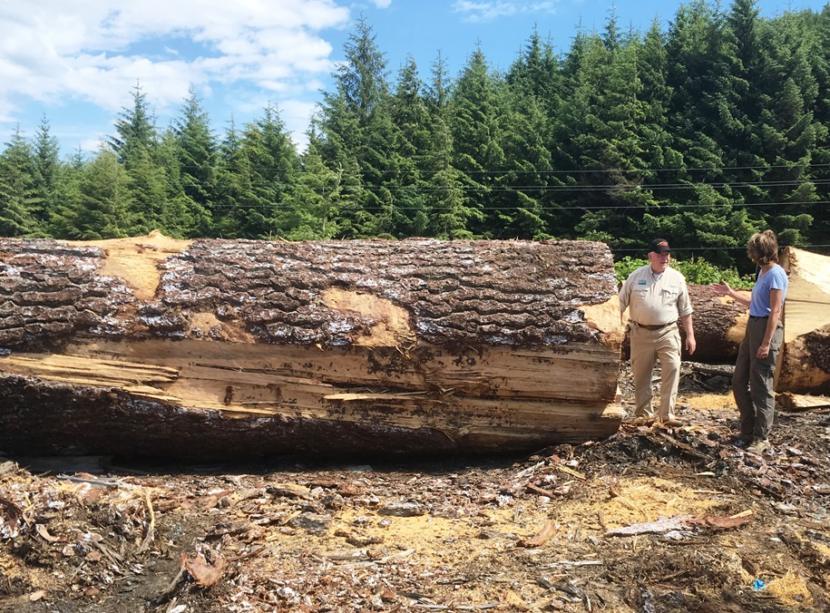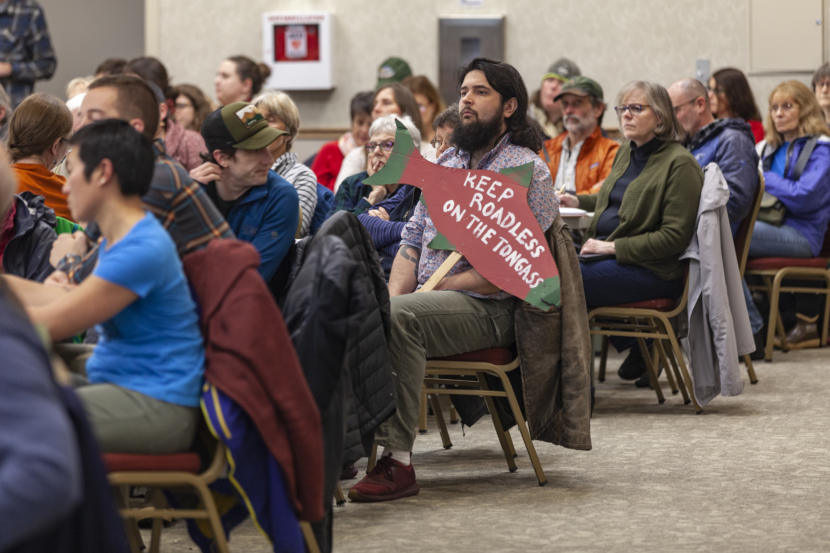
The Trump administration announced last week that it’s planning a full rollback of the Clinton-era “Roadless Rule” for the Tongass National Forest. The administration described the goal of the rollback as “maximum additional timber harvest.”
The Roadless Rule, simply stated, forbids road building and industrial activity — with some exceptions — in areas that don’t already have them. It covers nearly 9.4 million acres, or just over half, of Southeast Alaska’s Tongass National Forest.
Addressing civic and business leaders at Southeast Conference on Friday, Sen. Lisa Murkowski praised the federal government’s decision.
The Republican U.S. senator has been a long-time critic of the Roadless Rule in Alaska.
“The Roadless Rule is not just about timber,” Murkowski said via videoconference link. “It is about reasonable access for a wide variety of users, whether it is for renewable energy that we work so hard to build, whether for recreation, whether for mineral — it is for all pieces of the Southeast economy.”
Alaska’s congressional delegation has long opposed the 2001 rule. So has the state of Alaska, which sued and settled with the feds to win an exemption that lasted about seven years.
So those applauding the decision say don’t expect boom times right away. Especially not with logging
“I don’t think it’s going to be any more intensive than it was when we had total exemption in the period from 2004 to 2011,”Jim Clark, former chief of staff to Gov. Frank Murkowski told CoastAlaska.
The Juneau attorney has been helping fight the Roadless Rule from the beginning. He predicts it’ll help the mining and energy sectors — especially hydropower — by making it cheaper and easier to build roads on federal forest lands. But it won’t happen overnight.
“It would be a mistake to oversell either the problems that are going to occur for the environmental community as a consequence of this, or to oversell how much economic development is going to occur,” Clark said.
Industry groups signal support
The Alaska Forest Association — a timber industry group — applauded the federal government’s decision.
“Application of the Roadless Rule to the Tongass was never appropriate and has stifled the timber industry, and the larger Southeast economy,” AFA Board President Bert Burkhart said in a statement.
The Roadless Rule has been popular in Alaska. The Forest Service says it received about 411,000 comments, most of those in favor of keeping the status quo.
And during two years of public hearings, Southeast Alaskans came out in person to defend it. The reasons varied: concern about deer and salmon habitat, preserving wild places for guides to bring tourists.
Tribes were particularly vocal about keeping the national forest intact.
“We want to keep what’s here because we know the effects of logging in our area,” Joel Jackson, tribal president of the Organized Village of Kake said by telephone on Friday. “Old growth timber areas provide for us … berries and our medicines and also to hunt the deer and moose in our area.”
The federal government is required by law to consult with federally recognized tribes that live around the Tongass. Jackson says he feels like the agency was just going through the motions.
“I felt like they didn’t really listen,” he said. “And it turned out they didn’t.”

D.C. timber lobbyist linked Gov. Dunleavy with U.S. Ag Secretary Perdue
Agency emails obtained in a records request by Southeast Alaska Conservation Council show a D.C. lobbyist working for the Alaska Forest Association set up a telephone call between U.S. Secretary of Agriculture Sonny Perdue and Gov. Mike Dunleavy last year.
The governor’s office confirmed the May 7, 2019 call took place but would say nothing about what was discussed. The AFA, whose members were in Washington and in the room during the call, also declined comment.
The revelation of the joint timber industry/Alaska governor telephone call with Perdue has angered tribal leaders. Tribes had offered to travel to D.C. to meet with Secretary Perdue but were reportedly told only an undersecretary would be available to receive them.
Joel Jackson says it’s unfair that Trump administration cabinet officials will meet with industry but not tribal governments.
“They’re just the timber association and the tribes are sovereign nations,” Jackson said. “So that really upset me that we were brushed aside.”
Arguments against exemption range economic to ecological
Taxpayers have lost money on virtually every Tongass timber sale since the 1980s, says a D.C. budget watchdog group.
“We are concerned that opening up areas where they’re not currently roads to timber sales would increase taxpayer losses,” said Autumn Hanna, vice president of Taxpayers for Common Sense, a nonpartisan D.C. group.
Its recent report found that timber sales on federal lands cost taxpayers about $2 billion over the past 40 years.
“We’ve seen plenty of evidence already the taxpayers would lose significantly more by logging in these old growth areas that are harder to access and have been protected by the Roadless Rule,” Hanna said earlier this month.
The losses happen because the Forest Service actually pays for building new roads used by the timber industry to log public lands. In relatively remote areas with old growth stands of trees, she says, the costs to the public are even higher.
“So, taxpayers are upside down and underwater on the timber sales,” she added.
The Forest Service’s final environmental impact statement runs to nearly 700 pages. And critics have already seized upon one passage that downplays any impact to climate change. It says more logging would have only “a temporary influence on atmospheric carbon concentrations” that would get better as the forest grew back.
“Yeah, I don’t buy it,” said Dominick DellaSalla, an Oregon-based researcher with Wild Heritage, an advocacy group. “And I think they’re kicking the can down the road, there’s a lot more impacts that are going to happen.”
DellaSalla has advocated for transitioning Tongass timber harvests to secondary growth. He says the Tongass is a vast carbon sink as other forests in the Pacific Northwest are lost to development and more recently, wildfire.
“We’ve got to recognize that every action has a reaction in terms of the atmosphere,” DellaSalla told CoastAlaska. “And to deny that, the Forest Service is really denying climate change.”
Under the federal government’s rule-making process, the Secretary of Agriculture has to wait 30 days from releasing its formal “record of decision.” That’s what makes the rule binding. A future presidential administration could work to change that, but it would have to go through this multi-year rule-making process from scratch.
Agency’s 2016 Tongass forest plan limits old growth logging
But there’s another piece to the Tongass logging debate. The amount of old growth timber that can be cut is restricted by the Tongass forest plan that sets out a transition to young growth over 15 years.
Gov. Bill Walker’s administration petitioned for the Roadless Rule to be rolled back in 2018. But the state didn’t stop there: it also called on the federal government to revise the 2016 forest plan that limits old growth timber harvests.
“There was a request for revision of the 2016 plan,” said Clark, the natural resources attorney in Juneau. “There’s been absolutely no movement on that by the Forest Service or anybody else”
That would be an entirely different fight.
“Rulemaking takes a long time,” Clark said. “And this one would be, I think, more difficult than what we did on the Roadless exemption.”
In other words, the fight over old growth logging in Tongass National Forest is a conflict that moves about as swiftly as the trees grow.
